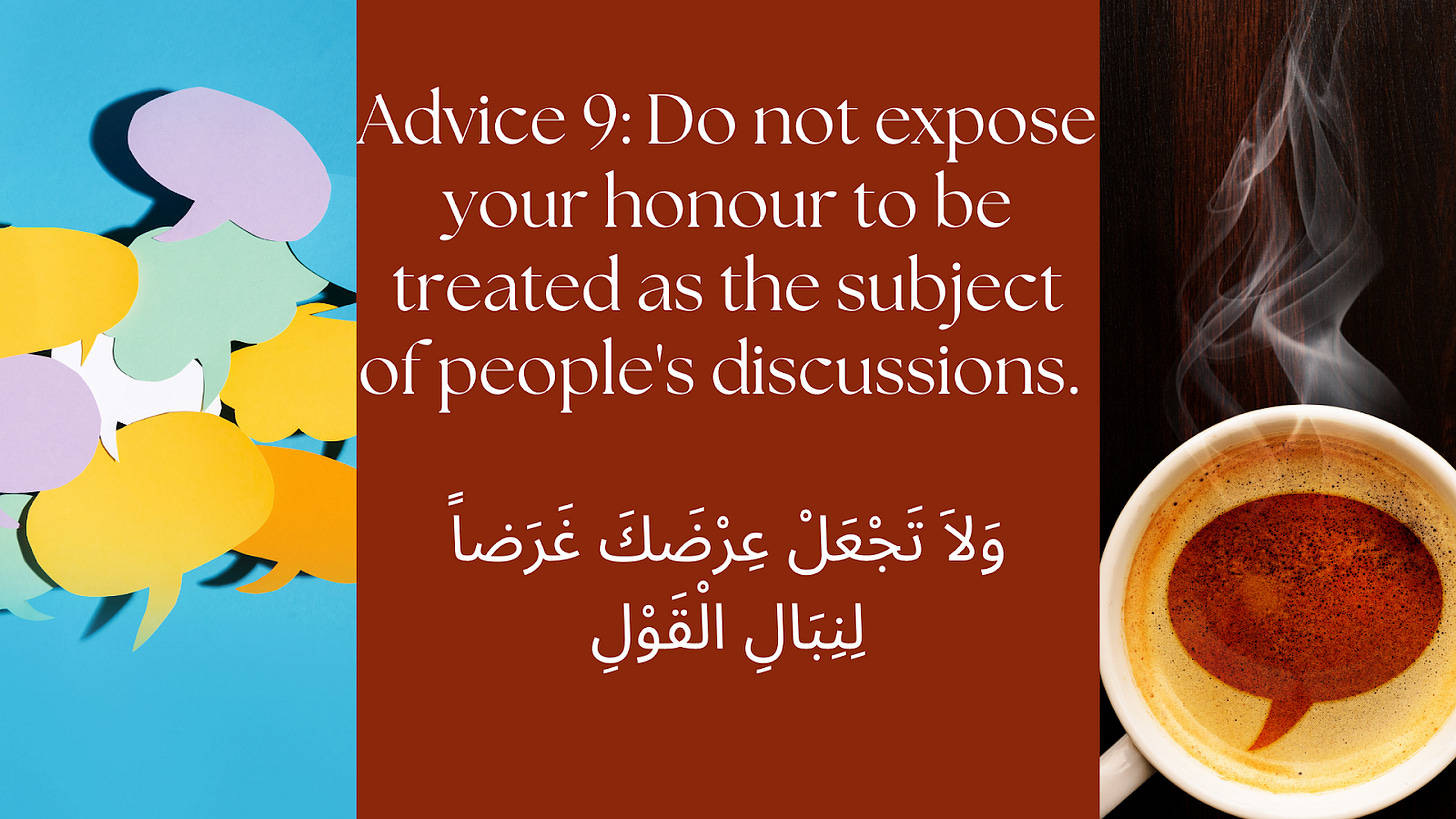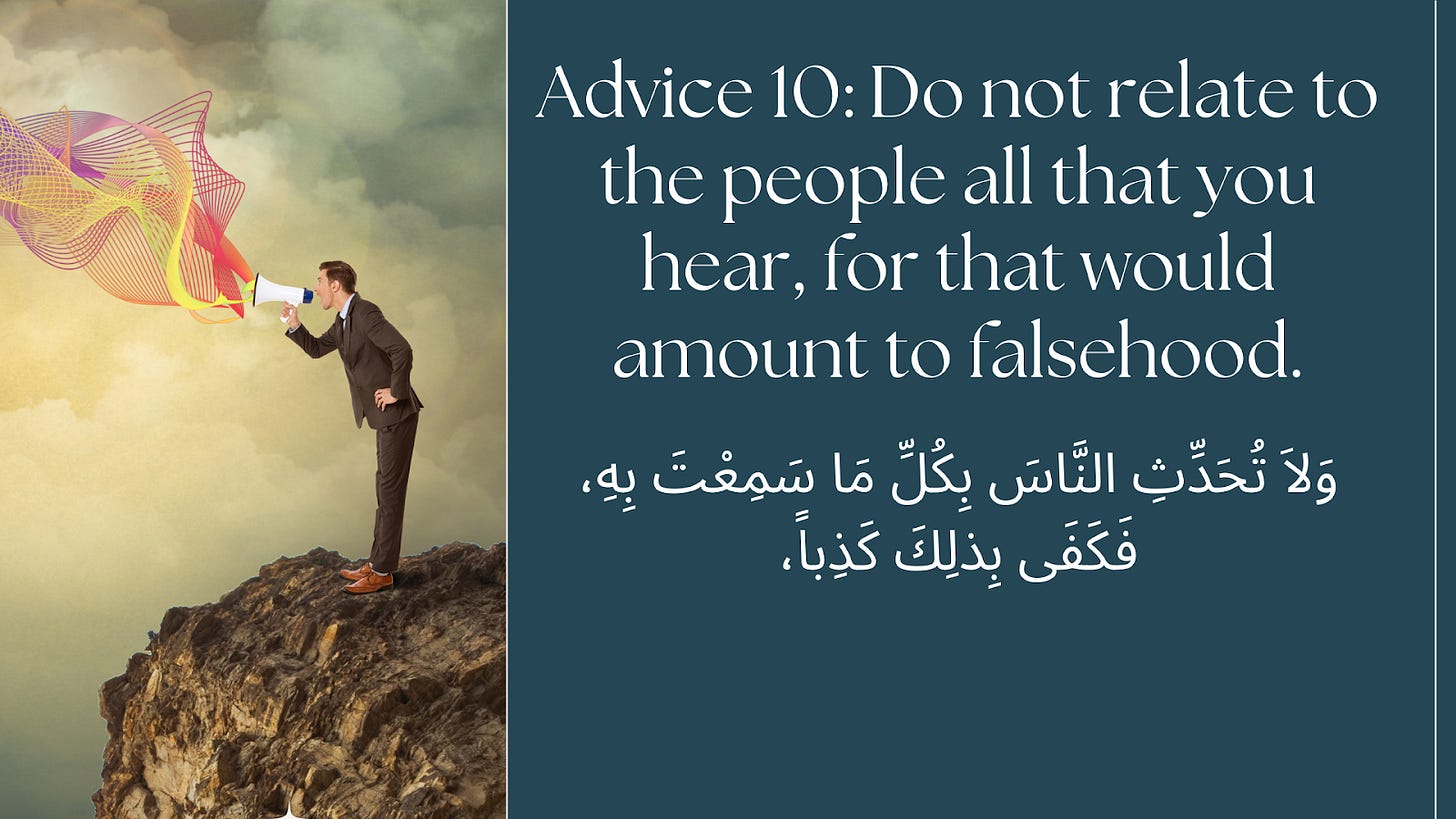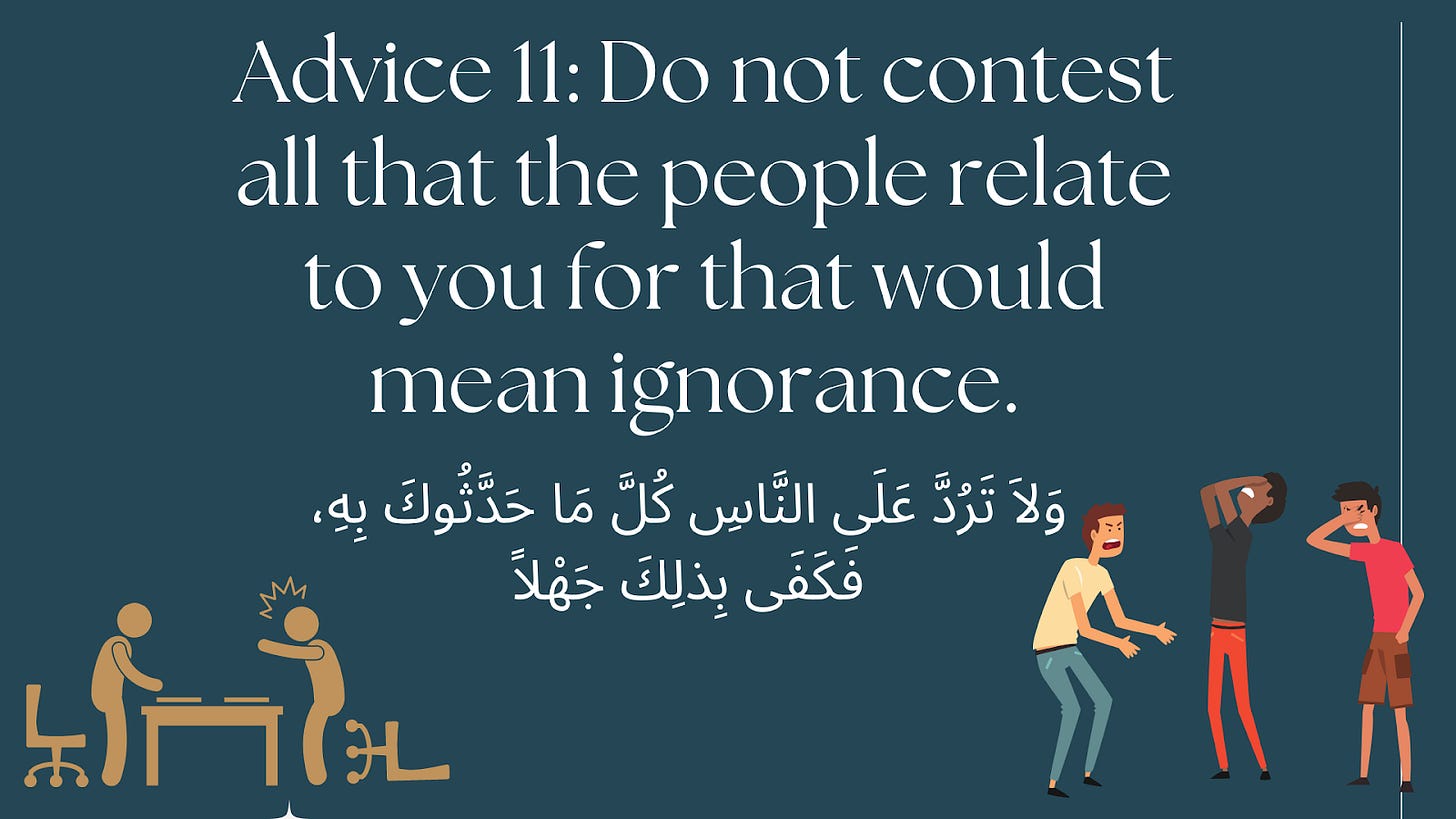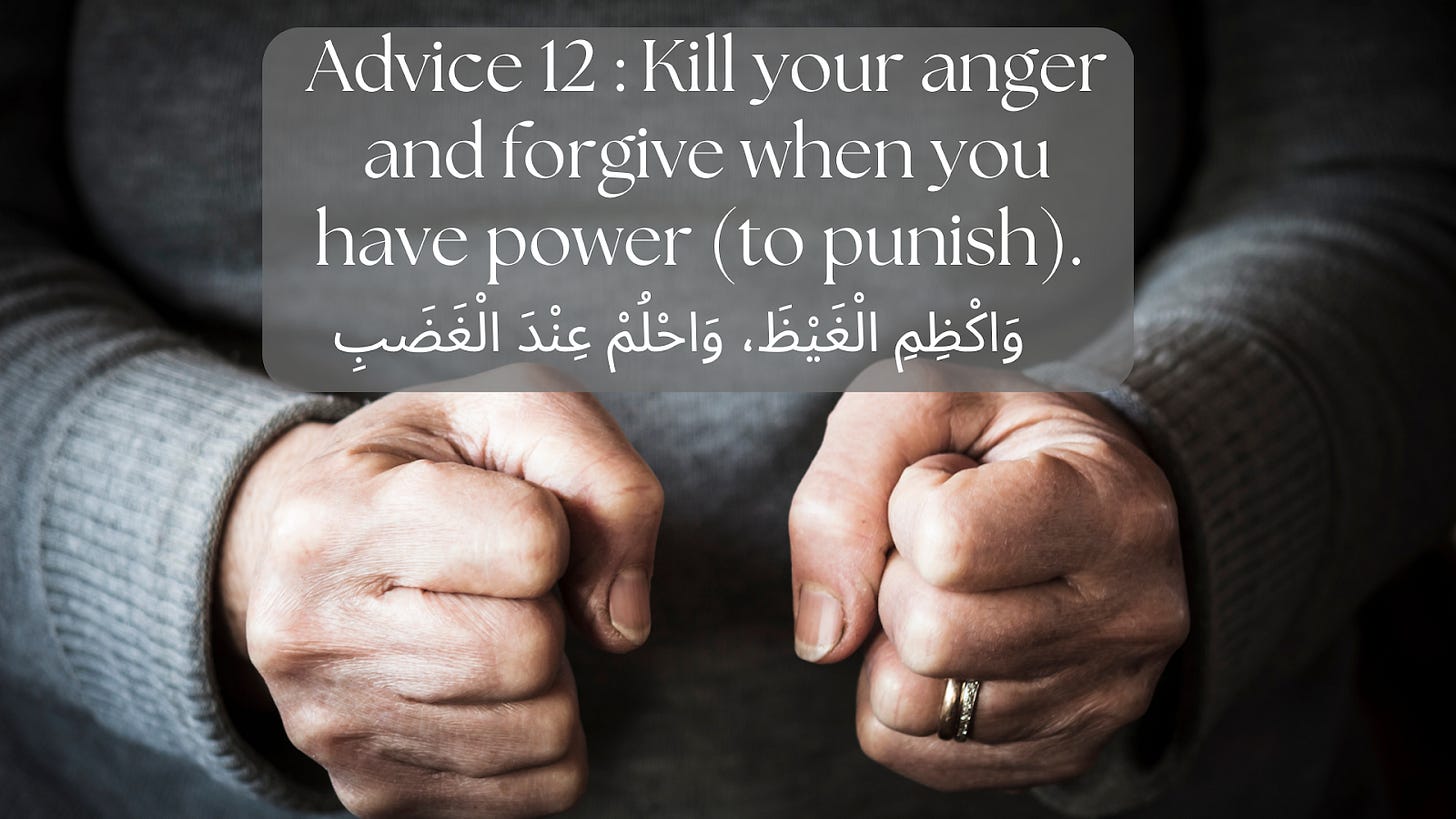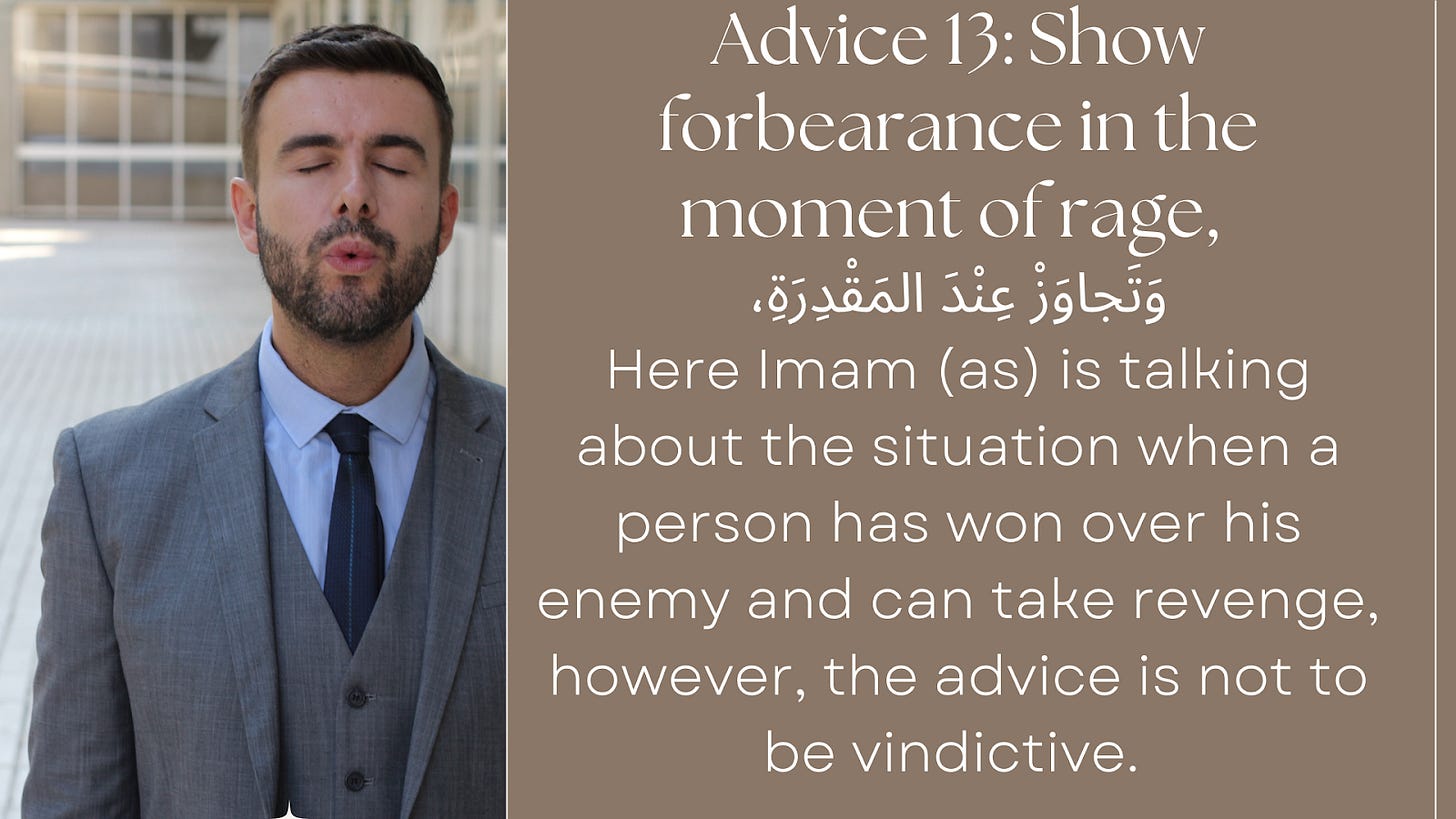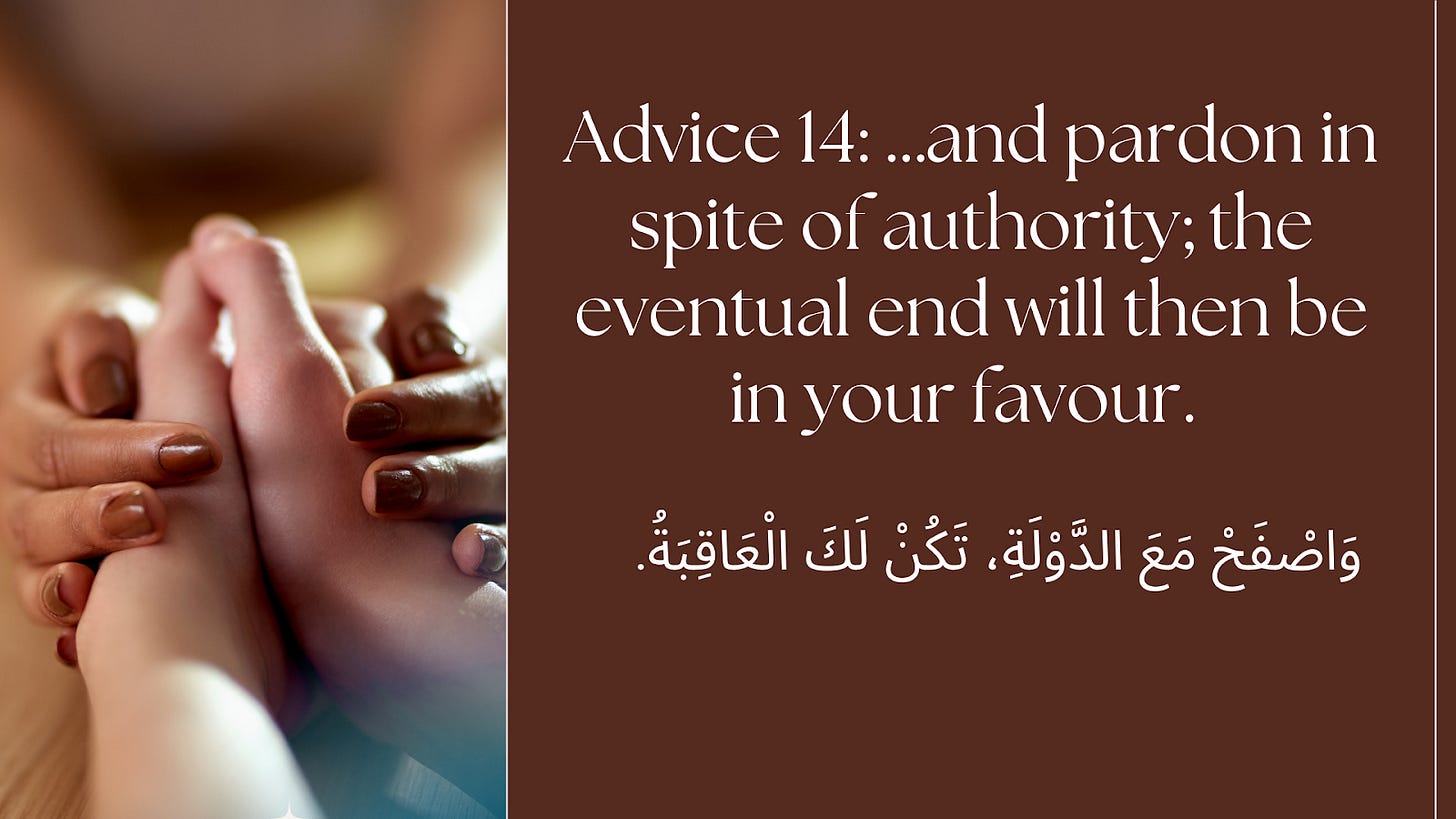Letter 69 - Thirty pieces of advice for the 30 days of any month [4 of 9]
﷽
In the Name of Allah, the All-Beneficent, the All-Merciful
Letter 69 of Amīr al-Muʾminīn (ʿa) to Harith Al Hamadani is the topic of our discussion. Imām (ʿa) guides us to 30 or so practical pieces of advice for success in this world and the hereafter. In the past posts, we have discussed the first eight pieces of advice.
We move on to the next few:
ADVICE 9: Don’t be the talk of the town!
وَلاَ تَجْعَلْ عِرْضَكَ غَرَضاً لِنِبَالِ الْقَوْلِ
“Do not expose your honor to be treated as the subject of people's discussions.”
In this advice, Imām (ʿa) emphasizes a very important point, which is not to put oneself in such a position, that his reputation gets tarnished. Therefore one should avoid actions, behavior, and speech that arouse people’s suspicions.
مُفَضّلِ بنِ عُمرَ: قالَ أبو عَبدِ اللّهِ (عَلَيهِ الّسَلامُ): لا يَنبَغي لِلمُؤمِنِ أن يُذِلَّ نَفسَهُ ، قُلتُ: بِما يُذِلُّ نَفسَهُ ؟ قالَ: يَدخُلُ فيما يَعتَذِرُ مِنهُ.
Imām Jaʿfar aṣ-Ṣādiq (ʿa) said, ‘A believer must never humiliate himself. When asked how he would humiliate himself, he replied, ‘By embarking upon something which he later has to make excuses for.”
Some examples:
Going to places where open sinning is taking place.
Talking about one’s own family issues, or exposing faults of family members.
Going to a gathering where there is music and sin, although you sat in a room, away from it all. Just attending could make you a subject of discussion amongst people, and lessen your respect in society.
Don’t Humiliate Yourself - A Ḥadīth by the Prophet (ṣ)
عَنِ النَّبِيِّ ص أَنَّهُ قَالَ فِي وَصِيَّتِهِ لَهُ يَا عَلِيُّ ثَمَانِيَةٌ إِنْ أُهِينُوا فَلَا يَلُومُوا إِلَّا أَنْفُسَهُمْ الذَّاهِبُ إِلَى مَائِدَةٍ لَمْ يُدْعَ إِلَيْهَا وَ الْمُتَأَمِّرُ عَلَى رَبِّ الْبَيْتِ وَ طَالِبُ الْخَيْرِ مِنْ أَعْدَائِهِ وَ طَالِبُ الْفَضْلِ مِنَ اللِّئَامِ وَ الدَّاخِلُ بَيْنَ اثْنَيْنِ فِي سِرٍّ لَهُمْ لَمْ يُدْخِلَاهُ فِيهِ وَ الْمُسْتَخِفُّ بِالسُّلْطَانِ وَ الْجَالِسُ فِي مَجْلِسٍ لَيْسَ لَهُ بِأَهْلٍ وَ الْمُقْبِلُ بِالْحَدِيثِ عَلَى مَنْ لَا يَسْمَعُ مِنْهُ.
Rasūlullāh (ṣ) gave these recommendations to Imām ʿAlī (ʿa) : “Oh Ali, eight people if they are insulted, they have no one to blame but themselves:
1.The one who goes to a meal he is not invited to,
2. the one who orders the owner of the house,
3. the one who seeks goodness from his enemies,
4. the one who seeks credit from the mean,
5. and the one who enters between two in a secret that they did not want anyone to enter into,
6. the one who underestimates the authority,
7. the one who sits in a meeting that has nothing to do with him,
8. the one who talks to someone who is not listening to him.
ADVICE 10 : Don’t Relate to Others All That You Know!
وَلاَ تُحَدِّثِ النَّاسَ بِكُلِّ مَا سَمِعْتَ بِهِ، فَكَفَى بِذلِكَ كَذِباً
“Do not relate to the people all that you hear, for that would amount to falsehood.”
This advice is explained well in Sermon 141 of Nahj al-Balāghah:
في النهي عن سماع الغيبة وفي الفرق بين الحقّ والباطل
In the prohibition of hearing backbiting and in the difference between truth and falsehood
أَيُّهَا النَّاسُ، مَنْ عَرَفَ مِنْ أَخِيهِ وَثِيقَةَ دِين وَسَدَادَ طَرِيق، فَلاَ يَسْمَعَنَّ فِيهِ أَقَاوِيلَ الرِّجَالِ، أَمَا إِنَّهُ قَدْ يَرْمِي الرَّامِي، وَتُخْطِيءُ السِّهَامُ، وَيَحِيكُ الْكَلاَمُ، وَبَاطِلُ ذلِكَ يَبْورُ، وَاللهُ سَمِيعٌ وَشَهِيدٌ. أَمَا إِنَّهُ لَيْسَ بَيْنَ الْحَقِّ وَالْبَاطِلِ إِلاَّ أَرْبَعُ أَصَابِعَ.
O people! If a person knows his brother to be steadfast in faith and of correct ways he should not lend ear to what people may say about him. Sometimes the bowman shoots arrows but the arrow goes astray; similarly talk can be off the point. Its wrong perishes, while Allah is the Hearer and the Witness. There is nothing between truth and falsehood except four fingers.
فسئل(عليه السلام) عن معنى قوله هذا، فجمع أصابعه ووضعها بين أذنه وعينه ثمّ قال: الْبَاطِلُ أَنْ تَقُولَ سَمِعْتُ، وَالْحَقُّ أَنْ تَقُولَ رَأَيْتُ
Amīr al-Muʾminīn (ʿa) was asked the meaning of this whereupon he joined his fingers together and put them between his ear and eye and said: It is falsehood when you say, "I have heard so," while it is truth when you say, "I have seen."
ADVICE 11 : Don’t Be Argumentative
وَلاَ تَرُدَّ عَلَى النَّاسِ كُلَّ مَا حَدَّثُوكَ بِهِ، فَكَفَى بِذلِكَ جَهْلاً
“Do not contest all that the people relate to you for that would mean ignorance”
الإمامُ عليٌّ (عَلَيهِ الّسَلامُ): مَن ناقَشَ الإخوانَ قَلَّ صَدِيقُهُ .
Imām ʿAlī (ʿa) said, ‘He who argues with his brothers has few friends.
رسولُ اللهِِ (صَلَّيَ اللهُ عَلَيهِ وَ آلِهِ): خَيرُ الأصحابِ مَن قَلَّ شِقاقُهُ وكَثُرَ وِفاقُهُ .
The Prophet (ṣ) said, ‘The best of companions is he who has little discord about him and much harmony.
Taking advice 10 and 11 together:
وَلاَ تُحَدِّثِ النَّاسَ بِكُلِّ مَا سَمِعْتَ بِهِ، فَكَفَى بِذلِكَ كَذِباً
وَلاَ تَرُدَّ عَلَى النَّاسِ كُلَّ مَا حَدَّثُوكَ بِهِ، فَكَفَى بِذلِكَ جَهْلاً
“Do not relate to the people all that you hear, for that would amount to falsehood.
Do not contest all that the people relate to you for that would mean ignorance.”
On the one hand Imām (ʿa) is saying, “Do not relate” and in the next sentence, he says “Do not contest”. Imām (ʿa) is trying to restrict excesses -
On the one hand, a person should not be so gullible that he accepts everything he hears and cites it everywhere (this could lead to lies), and on the other hand, he should not be so suspicious that he doubts everything he hears, and contests it, which is a sign of ignorance.
The next few pieces of advice by the Imām (ʿa) are about controlling anger and forgiving people. While they might seem quite similar, there are subtle differences which are worth taking a look at.
ADVICE 12 : Curb your anger and forgive
وَاكْظِمِ الْغَيْظَ، وَاحْلُمْ عِنْدَ الْغَضَبِ
“Kill your anger and show forbearance in the moment of rage”
The Imām (ʿa) guides us to وَاكْظِمِ الْغَيْظَ, which simply means to swallow your anger, until it totally vanishes. A deeper look shows that this is that type of anger that fills a person’s being, and is bursting to come out, however, the person uses every inch of patience that he has and curbs it to such an extent that not a bit of an angry reaction is apparent. This is not an easy task, and can only be done with determination and the knowledge that if the Imām (ʿa) has guided me to it, then this is the right thing to do.
When the Imām (ʿa) says, وَاحْلُمْ عِنْدَ الْغَضَبِ, “show forbearance in the moment of rage”, perhaps he is to referring to the occasions when the factors for anger are provided, but tolerance causes a person not to commit wrongdoing in the face of wrongdoing.
Controlling anger, being forbearing and lenient are instructions that are widely included in the Qurʾān and ḥadīth. These are manners and habits that reason dictates, because if people were to always respond to evil with evil, revolt when angry, react when provoked, then violence would intensify, enmities would become rooted. The result of this could be lack of security, widespread violence and unrest. However, when tolerance, forgiveness, kindness, and leniency prevail in a society, this society thrives and instead of unrest and enmity, there would be peace, security, love and friendship.
And this is the kind of atmosphere that will be prevalent after the zuhoor of our beloved Imām (ʿaj).
The crucial point here is to remember that although our Imām (ʿaj) can’t be seen by us, we can visualize a time when we will be able to see him. That will be a time when we will endeavor to have the best Akhlāq, why not start now?
ADVICE 13: Forbearance
وَتَجاوَزْ عِنْدَ المَقْدِرَةِ
“Show forbearance when you have power”
Here the Imām (ʿa) is talking about the situation when a person has won over his enemy and can take revenge, however, the advice is not to be vindictive.
The history of the life of the Noble Prophet (ṣ) and the Aʾimmah (ʿa) is a living proof of how our divine guides showed us how to live a life of kindness and leniency. When the Noble Prophet (ṣ) conquered Makkah, he could have gotten rid of all the criminals who had harassed him and those who had caused all kinds of problems, insults and harassment during the thirteen years he was in Makkah. The disbelievers were prepared for him to take revenge, but he did not do so and instead issued a decree of general amnesty. An atmosphere of security and love replaced insecurity and enmity.
فَبِمَا رَحْمَةٍ مِّنَ اللَّهِ لِنتَ لَهُمْ ۖ وَلَوْ كُنتَ فَظًّا غَلِيظَ الْقَلْبِ لَانفَضُّوا مِنْ حَوْلِكَ ۖ فَاعْفُ عَنْهُمْ وَاسْتَغْفِرْ لَهُمْ وَشَاوِرْهُمْ فِي الْأَمْرِ ۖ فَإِذَا عَزَمْتَ فَتَوَكَّلْ عَلَى اللَّهِ ۚ إِنَّ اللَّهَ يُحِبُّ الْمُتَوَكِّلِينَ
It is by Allah’s mercy that you are gentle to them; had you been harsh and hardhearted, they would have surely scattered from around you. So excuse them and plead for forgiveness for them, and consult them in the affairs, and once you are resolved, put your trust in Allah. Indeed Allah loves those who trust in Him. (Sūrah Āl ʿImrān:159)
ADVICE 14 : Forgiveness
وَاصْفَحْ مَعَ الدَّوْلَةِ، تَكُنْ لَكَ الْعَاقِبَةُ
“…and pardon in spite of authority; the eventual end will then be in your favor.”
The phrase "وَاصْفَحْ مَعَ الدَّوْلَةِ" refers to those who reach a position of authority, and instead of settling scores with opponents (as it sometimes happens), they never do such things and instead pardon and forgive.
The phrase "تَكُنْ لَكَ الْعَاقِبَةُ"; “the eventual end will then be in your favor” - this may refer to all 4 points about forgiveness/pardoning.
‘Hilm’ (forbearance) of a scholar
During the period of the leadership of the late Āyatullāh al-Udhma Sayyid Abu Al-Hasan Iṣfahāni, one night, as he led the congregation for the Maghrib prayers in Najaf al Ashrāf, a person with a knife stabbed his son (an extremely admirable and exemplary person), to death.
When Sayyid Abu Al-Hasan Iṣfahāni was informed of his son's martyrdom, exhibiting great patience and forbearance he said: “There is no power or strength save with Allah” and then, standing up, he led the ʿIshāʾ prayers.
Later, when the people approached him and sought to know of the action he desired to initiate against his son's murderer, he simply said: “I have forgiven him.”
Concluding today’s post, we pray to Allah (swt) to give us the opportunity to follow the ethical lessons from this blessed letter, to improve our lives in this world and the hereafter. Āmīn.
Until next week, الي اللقاء 😀

